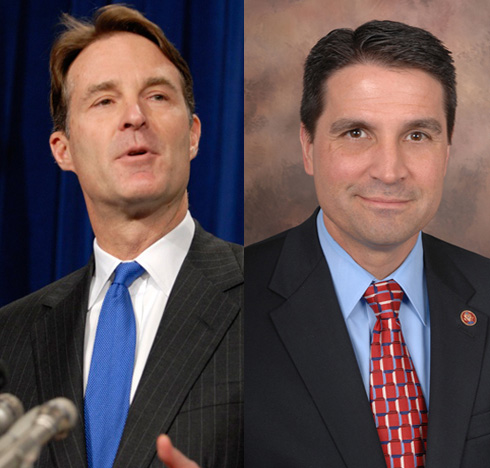The retirement of Sen. Evan Bayh (D-IN), who was often criticized by progressive Democrats, presents a certain ironic outcome — that the likely new Democratic nominee to replace him, Rep. Brad Ellsworth, is actually somewhat to Bayh’s right.
The various rating systems, and the two legislators’ voting records, shows that Ellsworth is generally in the same territory as Bayh on most issues. The difference comes on three key social issues: Abortion, gay rights, and gun control.
Both Bayh and Ellsworth come from usually conservative electorates. However, Ellsworth’s district is itself more conservative than Indiana as a whole. Indiana voted 60%-39% for George W. Bush in 2004, and then 50%-49% for Barack Obama in 2004. Ellsworth’s district voted 62%-38% for Bush in 2004, and then 51%-47% for John McCain in 2008. It would logically follow that the sort of Democrat who could elected in Ellsworth’s district would usually be a bit more conservative than the kind of Democrat that could have won repeated victories in Indiana.
The American Conservative Union, which selects key votes in Congress that it views as crucial to determining a legislator’s conservatism, gives Bayh a lifetime rating of 22.45% conservative. Under this same basic methodology — with some minor differences, due to the separate votes that are counted for the House and Senate — Ellsworth comes up at 28% conservative.
On abortion, Planned Parenthood Action Fund gives Bayh a grade of 86% on their key votes. By contrast, Ellsworth gets 0% — a solidly pro-life/anti-abortion vote. During the health care debate, Ellsworth voted for the Stupak Amendment to prevent funding of abortion, though he had previously worked on a less stringent alternative that did not satisfy Rep. Bart Stupak (D-MI) and other pro-lifers. Bayh also voted for Sen. Ben Nelson’s (D-NE) attempt to insert similar language as Stupak into the Senate health care bill. (To be exact, Bayh voted against tabling Nelson’s amendment, a roll call vote that was widely seen as being effectively the same as attempts to pass it.)
On gay rights, the Human Rights Campaign gave Bayh a grade of 90% in the 110th Congress (2007-2008). Ellsworth, by contrast, was graded at only 30%. The HRC previously told Huffington Post that Ellsworth’s past support for conservative efforts to amend the Constitution to forbid gay marriage made him “ineligible” for their endorsement. Bayh opposed the amendment when it last came up for a vote in 2006. It has not come up for a vote in either House of Congress since 2006, when Democrats took over Congress and Ellsworth himself was first elected, and thus neither Bayh nor Ellsworth have had occasion to vote on it since then.
On gun control, Bayh has received a grade of D- from the National Rifle Association. By contrast, Ellsworth has an A rating.
A review of interest group ratings from business groups and labor unions, courtesy of Project Vote Smart, shows not too much difference between the two politicians. In 2008, Bayh received a rating of 80%, with a lifetime score of 92%. Ellsworth’s score in 2008 — the same thing as his lifetime rating, due to his short time in Congress — was 87%. Overall, these groups show a mixed bag of results — some groups give Bayh a slightly more progressive score, some groups put Ellsworth ahead.
In realistic terms, an election victory by Ellsworth would easily be preferable to a Republican win — progressive would have to work to get his vote on various issues, but any of the GOP candidates would be hopeless on those issues. That said, liberals would have to work just a bit harder on Ellsworth than they already do with Bayh. Insofar as Bayh has complained about liberals putting pressure on him — and liberals have complained about having to put pressure on Bayh — that situation could actually be a bit more severe with Ellsworth









